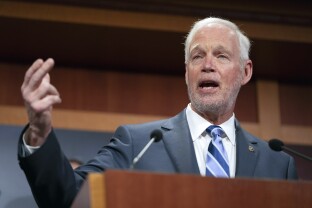After leaving the vote open for more than three hours, Senate Republicans advanced their reconciliation bill by a 51-49 vote Saturday, marking a critical step forward for the legislation.
This is only the first step in a long slog to getting the “one big, beautiful bill” through the Senate and back to the House. Republicans aren’t out of the woods just yet, but some members were bullish it was only a matter of time before the bill would pass the upper chamber.
“If we get the motion to proceed, we’ll have the motion to pass,” Oklahoma Sen. Markwayne Mullin said before the vote.
Getting the motion to proceed through was a tortured process. Only two Senate Republicans — Sens. Thom Tillis and Rand Paul — ultimately voted against the motion to proceed to debate on the bill. A number of previous holdouts on the motion to proceed, including Sens. Susan Collins and Josh Hawley, came around to support it, and Sen. Ron Johnson, who initially voted against proceeding, flipped his vote to “yes” at the last minute.
Sen. Lisa Murkowski also took a particularly long time during the vote — approximately two hours — before voting to support moving forward. Sens. Mike Lee, Cynthia Lummis, and Rick Scott took even longer before casting an “aye” vote, with Lee telling reporters they wanted to see more “deficit reduction” as multiple senators negotiated with Vice President JD Vance and Republican Leader John Thune throughout the night. Vance was on hand in case he was needed to break a tie.
Sen. Tim Sheehy also said Saturday that he would vote “no” on the motion to proceed if a proposed public-lands sale was included in the text, but he dropped that threat in under an hour and said he’d be offering an amendment to remove that provision in the bill instead. Lee later said he would remove the provision himself. Johnson has been adamantly concerned about spending levels in the bill, but ultimately moved the bill forward.
Collins told reporters that she wanted to “give deference to the majority leader’s power to bring bills to the Senate floor,” but that her vote to advance the bill “does not in any way predict how I’m going to vote on final passage.”
Hawley said he was voting for the bill on the basis of its benefits for Missouri — “about a half a billion dollars over baseline” to the rural hospital fund and its inclusion of his Radiation Exposure Compensation Act. He stressed that he still has issues with proposed Medicaid cuts in the bill, which would be implemented on a delay, from ever going into effect.
“In Missouri, we’re going to get an increase in overall Medicaid funds this decade, which is good for us. We’re also going to get the RECA program in Missouri, and also all of the Western states, which is going to be a lot of health care access for a lot of people,” Hawley told reporters.
He added: “So on that basis, I’m going to vote ‘yes’. I want to be clear, though, that the future Medicaid cuts are terrible,” and he would “do everything I can in the next three years” to see that they don’t take effect.
Democrats are now forcing the clerk to do a full reading of the bill, which will take hours. Then, there will be 20 hours of debate equally divided between Republicans and Democrats; Democrats are likely to max their time out, while Republicans will likely give most of theirs back. Then the Senate will embark on a lengthy vote-a-rama on amendments, and several Republicans are still hoping to see provisions in the bill changed.
All of that must be completed before a vote on final passage. Senate Republicans are hopeful they have the votes, but it’s not guaranteed. President Donald Trump has demanded that the bill be ready for his signature by the Fourth of July.
“We’re going to probably have some Republican amendments in it,” Mullin predicted Saturday. “I can’t imagine any Democratic amendments that’s going to come out that I’m going to support.”
Until just before the vote, support for the motion to proceed seemed shaky. A grab bag of Senate Republicans had voiced objections to provisions in the bill, including Medicaid cuts, increasing the debt limit, a potential public-lands sale and more.
Paul had repeatedly warned he would not support any version of the bill that included an increase to the debt limit. And prior to the vote, Tillis told reporters he would be a no on both the motion to proceed and final passage, citing proposed Medicaid cuts as a concern.
“I did my homework on behalf of North Carolinians, and I cannot support this bill in its current form. It would result in tens of billions of dollars in lost funding for North Carolina, including our hospitals and rural communities,” Tillis said in a statement released Saturday. “This will force the state to make painful decisions like eliminating Medicaid coverage for hundreds of thousands in the expansion population, and even reducing critical services for those in the traditional Medicaid population.”
The bill now goes back to the House, where Speaker Mike Johnson is dealing with a small majority and a number of members who still say they have problems with the bill.
—
Ursula Perano is a reporter at NOTUS.
Sign in
Log into your free account with your email. Don’t have one?
Check your email for a one-time code.
We sent a 4-digit code to . Enter the pin to confirm your account.
New code will be available in 1:00
Let’s try this again.
We encountered an error with the passcode sent to . Please reenter your email.


